Unit 4 I used to be afraid of the dark-Section A 1a-2d课件(共81张PPT)
文档属性
| 名称 | Unit 4 I used to be afraid of the dark-Section A 1a-2d课件(共81张PPT) | 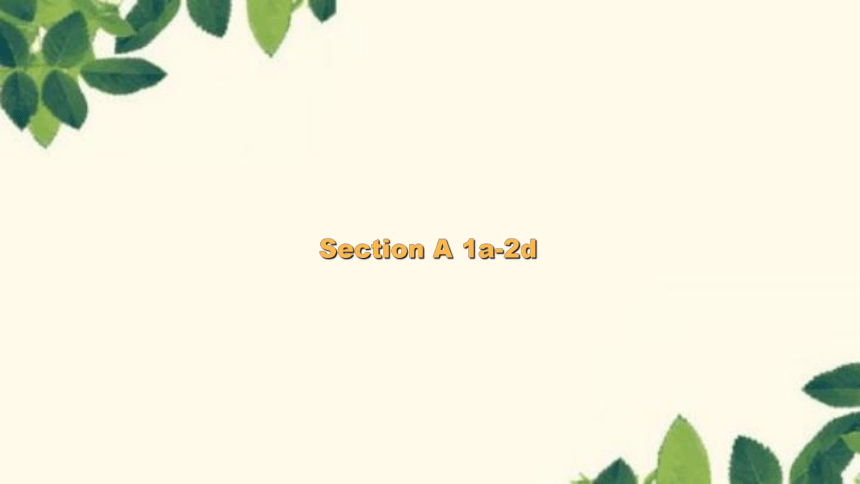 | |
| 格式 | ppt | ||
| 文件大小 | 3.1MB | ||
| 资源类型 | 教案 | ||
| 版本资源 | 人教新目标(Go for it)版 | ||
| 科目 | 英语 | ||
| 更新时间 | 2022-09-30 16:01:03 | ||
图片预览

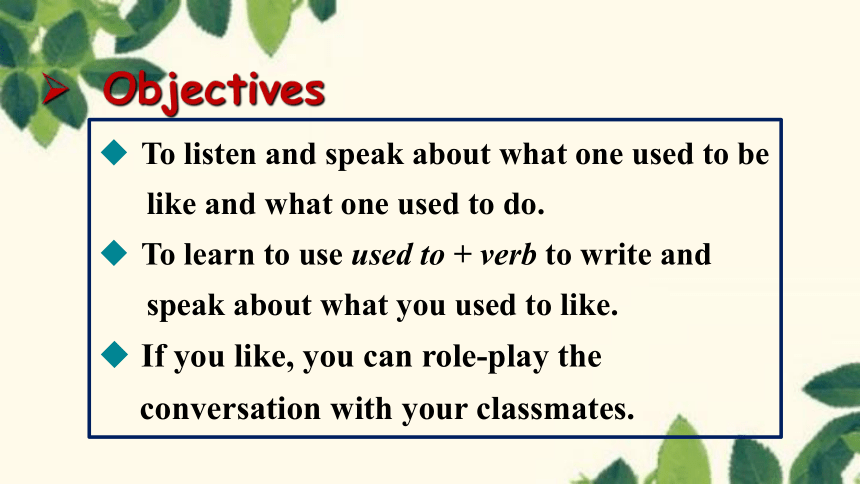
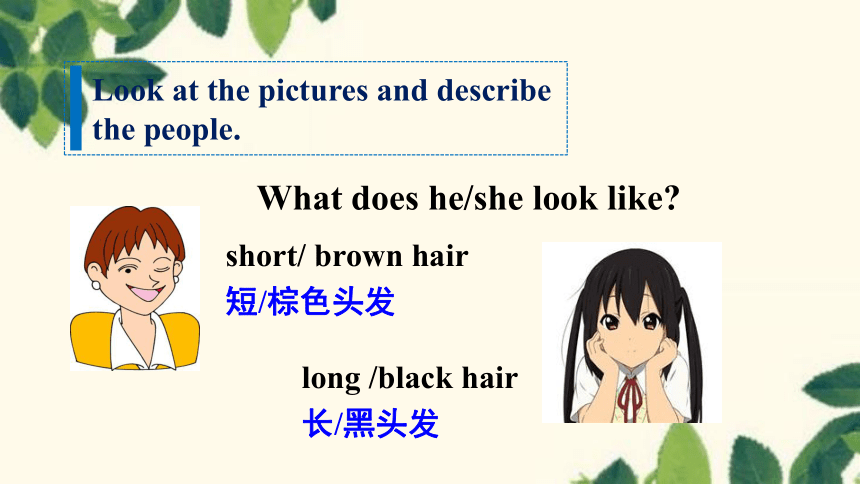
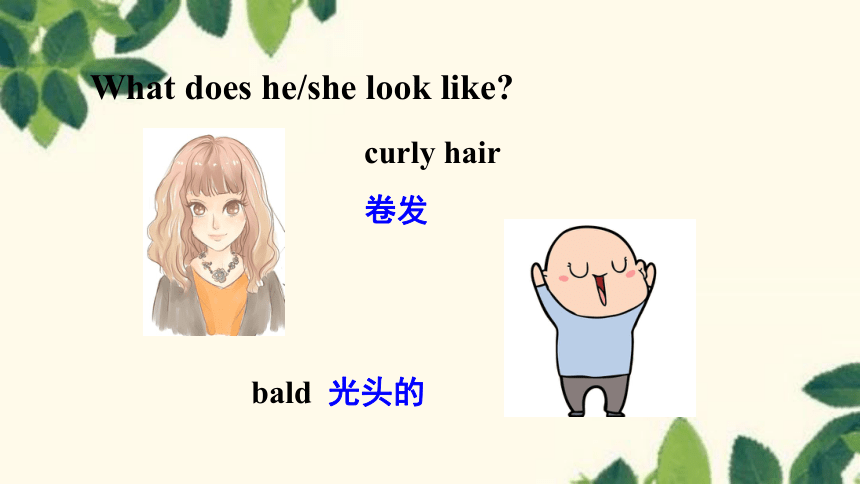

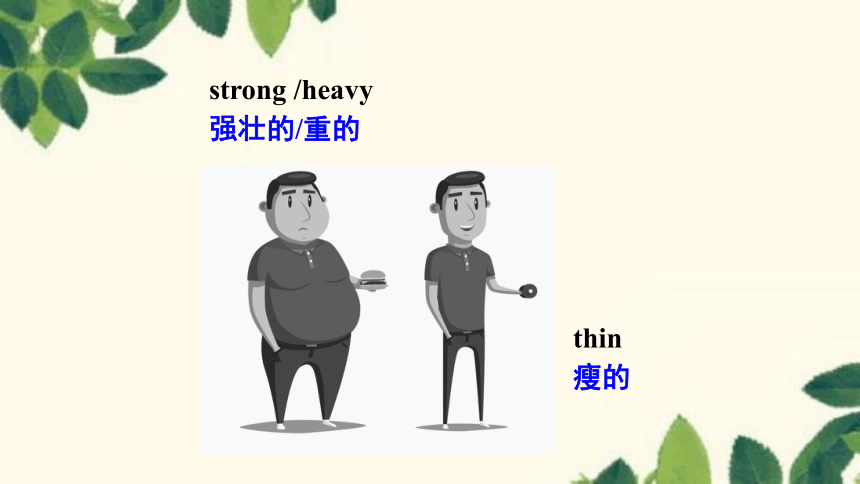
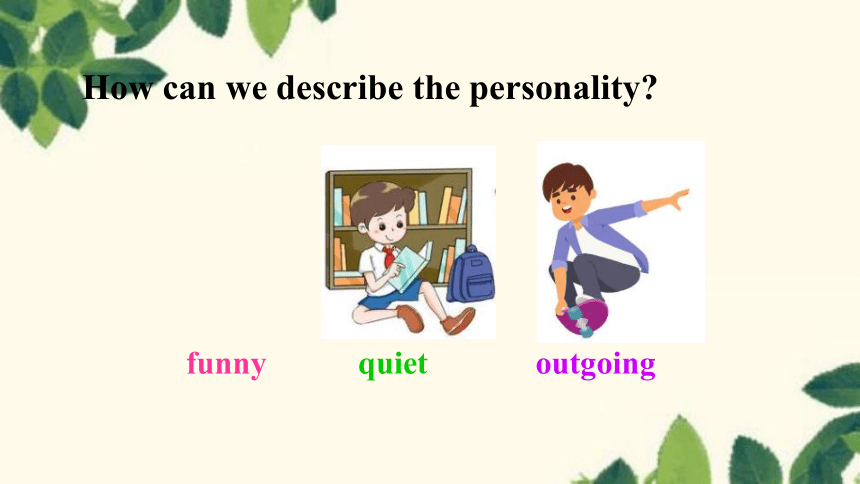
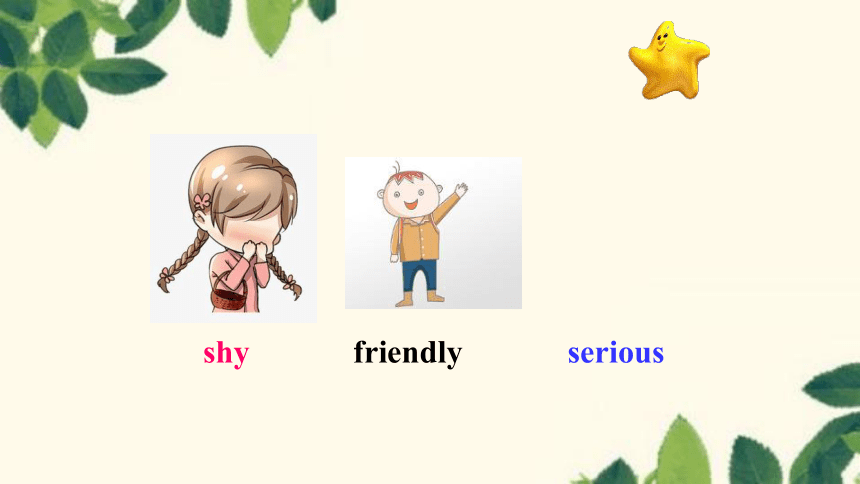
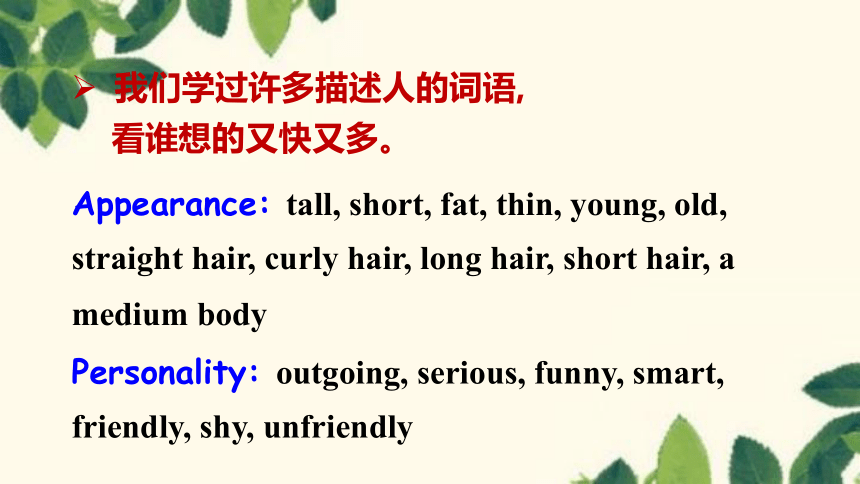
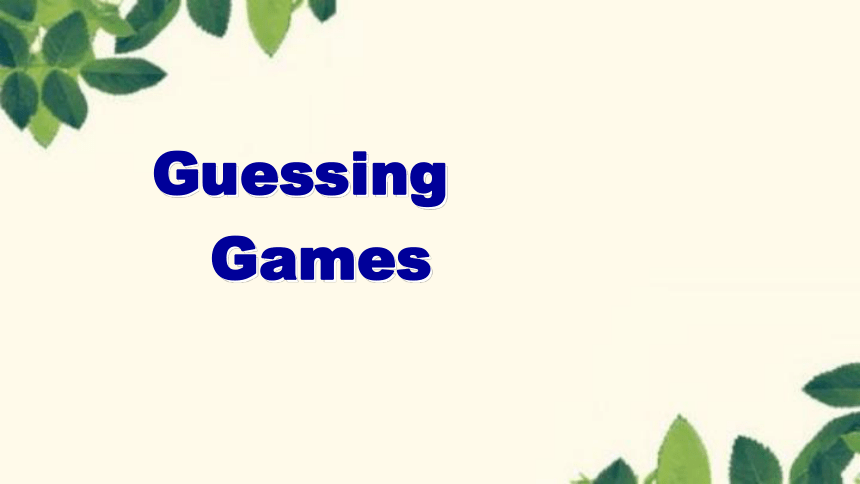
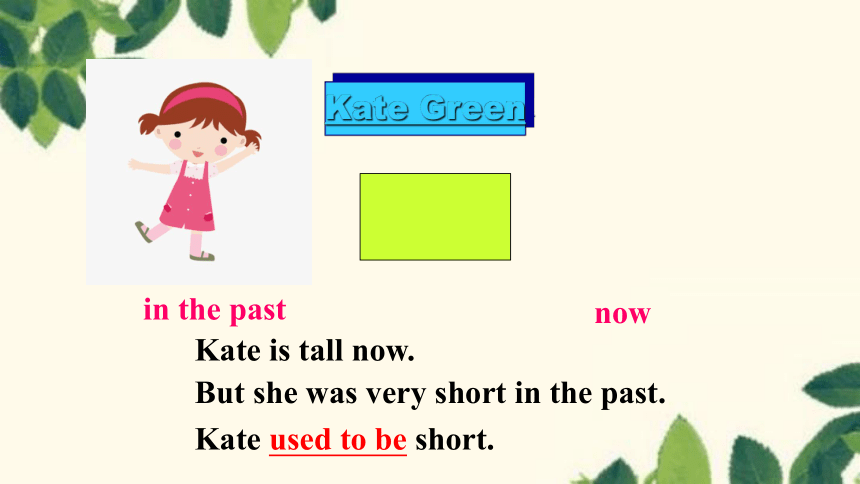
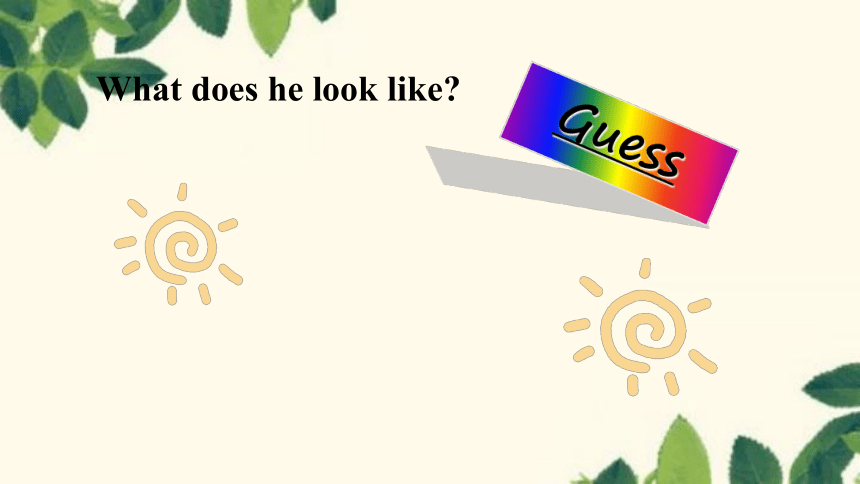
文档简介
(共79张PPT)
Section A 1a-2d
Objectives
To listen and speak about what one used to be
like and what one used to do.
To learn to use used to + verb to write and
speak about what you used to like.
If you like, you can role-play the
conversation with your classmates.
Look at the pictures and describe
the people.
What does he/she look like
short/ brown hair
短/棕色头发
long /black hair
长/黑头发
curly hair
卷发
bald 光头的
What does he/she look like
tall/ good looking
高/相貌好看的
short/ handsome
矮/英俊的
What does he look like
strong /heavy
强壮的/重的
thin
瘦的
How can we describe the personality
funny
quiet
outgoing
shy
serious
friendly
我们学过许多描述人的词语,
看谁想的又快又多。
Appearance: tall, short, fat, thin, young, old, straight hair, curly hair, long hair, short hair, a medium body
Personality: outgoing, serious, funny, smart, friendly, shy, unfriendly
Guessing
Games
in the past
now
Kate Green
Kate is tall now.
But she was very short in the past.
Kate used to be short.
What does he look like
Guess
He used to be short, but now he is tall.
He was short when he was a child, but he is tall now.
Change in appearance
VS
He used to be ugly, but now he is really handsome.
He was ugly when he was a student, but he is really handsome now.
short/tall
young/old
heavy/thin
He/She used to be/have/wear…, but now he/she is/has/wears ….
Make sentences
VS
He used to be shy but now he is really smart.
He was shy when he was a child, but he is really smart now.
Change in personality
He used to be …, but now he is …
outgoing
quiet
friendly
funny
shy
smart
serious
active
…
1a Fill in the chart with words to describe people.
Appearance Personality
tall outgoing
straight hair funny
heavy
smart
young
unfriendly
What about you
1b Listen. Bob is seeing some friends for the
first time in four years. What did his friends
use to look like
Mario used to be______ .
He used to wear_______.
2. Amy used to be________.
She used to have _______hair.
3. Tina used to have_____ and______ hair.
short
glasses
tall
short
red
curly
Listen again and complete the exercise.
Conversation 1
Bob is here with his ____________ and he hasn't seen Mario for ________ years.
Conversation 2
Amy used to be really tall because Bob was _________ in the past.
parents
four
short
Conversation 3
Tina: Hiya, Bob.
Bob: Hi, Tina. You've changed, too.
Tina: Oh, yeah
Bob: ____________________
Tina: Yeah, ______________, didn't it
Bob: And ______________!
Tina: Yeah, _________________.
You have blonde hair!
it used to be red
it's straight
it used to be curly
1c Look at the picture in 1a and make conversations.
A: Did Mario use to be short
B: Yes, he did. He used to be really short.
A: What’s he like now
B: He’s tall now.
A: Did Tina use to be heavy
B: Yes, she did. She used to be really heavy.
A: What’s she like now
B: She’s thin now.
A: Did Amy use to be straight hair
B: Yes, she did. She used to have straight hair.
A: What’s she like now
B: She has curly hair now.
____ friendly _____outgoing _____serious ____humorous _____ silent _____active
_____brave ______quiet _____ helpful
2a Listen and check ( ) the words you hear.
2b Listen again and complete the chart about
how Paula has changed.
In the past Now
1. Paula used to be really
______. She was always silent in class. She wasn’t very________. She was never brave enough to ask questions. 1. Now she’s more interested in_________. She plays ______ almost every day. She’s also on a ________team.
quiet
outgoing
sports
soccer
swim
In the past Now
2. She got good grades in ________.
She was also good in______________. She used to play the ______. 2. She still plays the ________ from time to time.
science
music class
piano
piano
2c Make conversations about Paula using the
information in 2b.
A: Paula used to be really quiet.
B: I know. She was always silent in class.
Paula used to be really quiet.
I know. She was always silent in class.
She wasn’t very outgoing. She was never brave enough to ask questions.
But she was always friendly. She got good grades in exams. And she was really good in music class, too. She used to play the piano.
But now she is more interested in sports. She plays soccer almost every day. She still plays the piano from time to time.
I know, she’s so active now.
Alfred: This party is such a great idea!
Gina: I agree. It’s been three years since we last saw
our primary school classmates.
Alfred: It’s interesting to see how people have changed.
Gina: Billy has changed so much! He used to be so
shy and quiet.
Alfred: Yeah, his face always turned red when he
talked to girls!
2d Role-play the conversation.
Gina: I used to see him reading in the library every
day.
Alfred: That’s because he was a really good student.
He studied hard and got good scores on his exams.
Gina: Did he use to wear glasses
Alfred: Yes, and he used to be thin, too. But look how big
and strong he is now.
Gina: He’s so popular now. Look at all the girls around
him!
Role-play
A: This party is such a great idea!
B: I agree....
Read the conversation and fill in blanks.
Alfred and Gina are __________ . They think Billy has changed _________ . He __________ be so shy and quiet. His face always turned ______ when he talked to girls! I used to see him __________ in the library every day. He was a really ________ student. He studied _________ and got good _________ on his exams. He used to be _________, too. But look how ______________ he is now. He’s so ____________ now.
classmates
a lot
used to
red
reading
good
hard
scores
thin
big and strong
popular
I used to be afraid of the dark.
used to do sth. 过去常常做某事
表示过去经常性或习惯性的动作或状态,暗指现在已经不存了,强调过去与现在的对比。
used to的否定形式有两种:didn’t use to或usedn’t to。
used to用于疑问句时,可借助助动词did,也可以将used提到主语前。
Language points
They used to be good friends.
他们过去是好朋友。 (暗示现在不是了)
Mrs Brown didn’t use to / usedn’t to travel in summer.
布朗夫人过去夏天不旅游。
Did you use to / Used you to play the guitar
他过去弹吉他吗?
几个易混结构的比较:
结构 意义 to的作用
used to do sth. 过去常常做某事 不定式
符号
use ... to do sth. 用……做……
be used to do sth. 被用来做……
be used to doing sth. 习惯于做某事 介词
use ... to do sth. 用……做……
They use the knife to cut meat. 他们用刀切肉。
be used to do sth. 被用来做某事
This kind of wood is used to make paper.
这种木头是被用来做纸的。
be / get used to sth. / doing sth.
习惯于某事 / 做某事
Lucy has been used to (eating) Chinese food.
露西已经习惯(吃)中餐了。
I think you’ll get used to the climate soon.
我想不久你就会习惯这种气候的。
Mario, you used to be short, didn’t you
马里奥,你过去很矮,对吗?
本句是一个反义疑问句,反义疑问句的特点是“前否后肯”
或“前肯后否”,而且后半句在时态、人称和数等方面必须
与前半句保持一致。
You are a doctor, aren’t you 你是个医生,是吗?
we can’t take books out, are we 我们不能把书带出去,对吗?
反义疑问句用法歌诀
反义问句要点三,前后谓语正相反;
附加问句not现,必须缩写是习惯;
最后一点应注意,问句主语代词填。
反义疑问句的回答:
1)回答反义疑问句和回答其他一般疑问句的结构一样。
如果答语是肯定的,用“Yes +肯定结构”。
如果答语是否定的,用“No +肯定结构”。
— He enjoys dancing, doesn’t he 他喜欢跳舞,对吗?
—Yes, he does. / No, he doesn’t.
是的,他喜欢。/不,他不喜欢。
2) 回答陈述部分为否定句的反义疑问句时,Yes或是No的汉语意思与它们本身的词义相反。
—You didn’t go to work, didn’t you 你没有去上班,对吗?
— Yes, I did. / No, I didn’t. 不,我上班了。/是的,我没上班。
What’s he like now 他现在什么样子?
What +be +主语+like
用来询问某人的外貌特征,意为“……长什么样?”,
相当于 what do /does +主语+like
—What’s your brother like
=What does your brother like 你哥哥长什么样?
辨析:be like和look like
be like:“像……一样”,常指品德、相貌等相像更侧重人的个性特征。
look like:“看起来像……”常指外貌上相像。
The twin sister are like their father.
He looks like his mother.
She was always silent in class.
在课堂上她总是很沉默。
silent作形容词,意为“不说话的;沉默的”,
其名词形式为silence(沉默;寂静)。
She was silent when her mother asked her questions.
她妈妈问她问题时她沉默不语。
(1) silent 的副词形式是silently (默默地;静静地)。
He went in to the classroom and sat down silently.
他走进教室静静地坐下来。
(2) keep silent意为“保持安静”。
Please keep silent in public places.
在公共场合下请保持安静。
She still play the piano from time to time.
她仍然时常弹钢琴。
(1) still 副词,意为“仍然”,用来说明某人或某物没有变化。still 在句中通常放在实义动词前, 助动词、情态动词、连系动词后面。
The woman still lives in shanghai.
He is still in the classroom.
(2) from time to time 意为“时常;有时”相当于sometimes/at times。
She goes to the movies from time to time.
This party is such a great idea!
这个派对真是个好主意!
He used to be so shy and quiet.
他过去非常害羞安静。
such & so 辨析
such为形容词,意为“这(那)样的”,主要修饰名词;
so是副词,意为“这(那)么;如此地”,主要修饰形容词和副词。
e.g.
Do you like such weather 你喜欢这样的天气吗?
I’m so glad to see you. 很高兴见到你。
He can draw so well. 他画得那么好。
当名词前有many,much,few或little等词修饰时,要用so而不用such。
e.g.
There are so many / few people in the hall.
大厅有这么多/这么少的人。
You have so much / little homework today.
你今天有这么多/这么少的作业。
“such + a / an +形容词+可数名词单数形式”相当于“so +形容词+a / an +可数名词单数形式”,表示“如此……的一个……”。
e.g.
She is such a lovely girl. = She is so lovely a girl.
她是如此可爱的一个女孩。
Ⅰ. 根据汉语提示填空,完成句子。
1. He has plenty of ____________ (幽默的) stories to tell us.
2. You’d better keep _______ (沉默) about what happened.
3. The lazy cat isn’t very _________ (有用的) in catching mice.
4. Tom got the highest _________(得分) in the exam.
humorous
silent
helpful
score
Exercises
Ⅱ. 根据所给汉语提示完成英语句子。
1. My uncle _________________(以前是个司机), but now he is an actor.
2. Tom’s father _________________(过去常常看书) after lunch.
3. Mary __________________(以前常常骑自行车) to work, but now she ____________________(习惯步行) to work.
4. The pencil __________________(被用来书写).
used to be a driver
used to read
used to ride a bike
is used to walking
is used to write
Ⅲ. 选用such或so填空。
1. The man told us ____ funny a story.
2. She has _____ a beautiful dress.
3. How can you get ____ much money to buy the car
4. Don’t go out in ______ cold weather.
5. Don’t eat _____ quickly.
so
such
so
such
so
Ⅳ. 翻译句子。
1. 马里奥过去很矮,他戴着眼镜。
__________________________________________
2. 他现在长什么样子?
_________________
Mario used to be short and wear glasses.
What’s he like now
3. 保拉以前很安静,她在班上总是很沉默。
_________________________________
________________________
4. 她总是不够勇敢去问问题。
___________________________________________
Paula used to be really quiet. She was always silent in class.
She was never brave enough to ask questions.
中考链接
Our city is cleaner than it ________ be.
is used to B. used to
C. uses to D. is used
B
句意“我们的城市比过去干净。”
Recite the conversation in 2d.
Preview the next part.
Homework
To listen to 1c and 1d, then complete them.
To learn new words: pronounce, increase, speed, partner…
Objectives
Do you have difficulties in learning English
What things are difficult for you
Discussion
What’s your problem in learning English How do you solve them
I have difficulties in
learning English.
Can you help me
The difficulties he has in learning English.
New words: can’t pronounce some of the words
spell some English words
Speaking: be afraid to speak
Listening: can’t understand spoken English
Writing: can’t make complete sentences
Reading: read very slowly
Grammar: make mistakes
1a Learning English can be difficult. What things are
difficult for you Read the list. Check ( ) the
statements that are true for you.
____ I can’t pronounce some of the words.(v. 发音)
____ I can’t always understand spoken English.
____ I don’t know how to increase my reading speed.
____ I can’t spell some English words.
____ I often make mistakes in grammar.
(v. 增加;增长)
(n. 速度)
1b What other things are difficult for you
Make a list.
1. I don’t know enough words to write well.
2. ________________________________
3. ________________________________
4. ______________________________
5. ________________________________
can’t get the pronunciation right
be afraid people might laugh at me
forget a lot of new words
don’t get much writing practice
1c Paul finds it difficult to learn English. Listen and
complete the learning challenges he talks about.
1. He can’t get the__________________ right.
2. He___________ a lot of new words.
3. He can’t always_____________ when people talk to him.
4. He doesn’t get much___________ practice.
pronunciation
forgets
understand
writing
Challenges
1d Listen again. Complete the solutions.
1. ________________ can help.
He can always_____________________ in his notebook and study them at home.
He can_____________________________ to practice speaking.
He should find a _______ to practice writing.
Listening
write the new words
join an English language club
pen pal
Solutions
1e Role-play conversations using the information
in 1c and 1d.
① A: I don’t have a partner to practice English with.
B: Maybe you should join an English club.
② A: I always forget the new words.
B: You can write the new words in your notebook
and study them at home.
A: I can’t always understand when people talk to me.
B: Maybe you should join an English language club
to practice speaking.
A: I forget a lot of new words.
B: Maybe you should write the new words in your
notebook and study them at home.
Pair work
1.I often make mistakes in grammar.
mistake n. 错误;过失 make mistakes 犯错
Tom didn’t make a single spelling mistake in his composition. 汤姆在这篇作文里一个字也没拼错。
mistake vt. 弄错,误解
I mistook the number and went to the wrong room. 我记错号码, 走错了房间。
Language points
2. challenge n. 挑战
He wants a career that offers a challenge. 他想要一份有挑战性的事业。
vt. 向……挑战;对……提出异议
I challenged him to show his proof. 我要他拿出证据。
He challenged my view on that matter. 他就我对那件事的看法提出异议。
3. solution n. (问题、疑难等的) 解决;解答
It may take a long time to find a solution to the problem. 也许要花很长时间才能找到解决这个问题的办法。 The solution of the problem requires a lot of time. 解决这个问题需要很多时间。
4. Maybe you should join an English club.
join/join in/take part in
(1) join=be a member of 参加, 指加入某种组织,并成为其中的一员。
join the army / party 入伍/党 join the club 加入俱乐部
join in 后接活动名称
join sb. 加入到某个人群之中
Ⅰ. 用所给词的适当形式填空。
1. Sometimes, I can’t get the____________ (pronounce) right.
2. I don’t know how__________ (improve) my spoken English.
3. The more careful you are, the fewer_________ (mistake)
you’ll make.
4. You can find a pen pal to practice________ (write).
5. She can’t______ (spell) English words.
Exercises
pronunciation
to improve
mistakes
writing
spell
Ⅱ. 用方框中所给单词的适当形式填空。
We must learn to face the __________ in our life.
2. He has trouble in understanding _______ English.
3. Can you think of a good _______ to the problem
4. You can listen to the tapes to get much listening _______.
5. The more careful you are, the fewer _______ you’ll make.
solution, practice, mistake, spoken, challenges
challenges
spoken
solution
practice
mistakes
— Excuse me, can you teach me how to ______
this new word
— No problem. Look at my mouth and listen
carefully.
A. prove B. pronounce
C. prepare D. produce
B
中考链接
证明
准备
发音
生产
你能教给我这个新词怎么样……
— Miss Huang always advises us to practice
speaking English after class.
— She is right. Speaking is an important
language __________.
A. sign B. skill C. suggestion
符号
技能
建议
B
Review the new words and expressions you’ve learned today.
Preview the article How Can You Become a Successful Learner on page 6.
Homework
Section A 1a-2d
Objectives
To listen and speak about what one used to be
like and what one used to do.
To learn to use used to + verb to write and
speak about what you used to like.
If you like, you can role-play the
conversation with your classmates.
Look at the pictures and describe
the people.
What does he/she look like
short/ brown hair
短/棕色头发
long /black hair
长/黑头发
curly hair
卷发
bald 光头的
What does he/she look like
tall/ good looking
高/相貌好看的
short/ handsome
矮/英俊的
What does he look like
strong /heavy
强壮的/重的
thin
瘦的
How can we describe the personality
funny
quiet
outgoing
shy
serious
friendly
我们学过许多描述人的词语,
看谁想的又快又多。
Appearance: tall, short, fat, thin, young, old, straight hair, curly hair, long hair, short hair, a medium body
Personality: outgoing, serious, funny, smart, friendly, shy, unfriendly
Guessing
Games
in the past
now
Kate Green
Kate is tall now.
But she was very short in the past.
Kate used to be short.
What does he look like
Guess
He used to be short, but now he is tall.
He was short when he was a child, but he is tall now.
Change in appearance
VS
He used to be ugly, but now he is really handsome.
He was ugly when he was a student, but he is really handsome now.
short/tall
young/old
heavy/thin
He/She used to be/have/wear…, but now he/she is/has/wears ….
Make sentences
VS
He used to be shy but now he is really smart.
He was shy when he was a child, but he is really smart now.
Change in personality
He used to be …, but now he is …
outgoing
quiet
friendly
funny
shy
smart
serious
active
…
1a Fill in the chart with words to describe people.
Appearance Personality
tall outgoing
straight hair funny
heavy
smart
young
unfriendly
What about you
1b Listen. Bob is seeing some friends for the
first time in four years. What did his friends
use to look like
Mario used to be______ .
He used to wear_______.
2. Amy used to be________.
She used to have _______hair.
3. Tina used to have_____ and______ hair.
short
glasses
tall
short
red
curly
Listen again and complete the exercise.
Conversation 1
Bob is here with his ____________ and he hasn't seen Mario for ________ years.
Conversation 2
Amy used to be really tall because Bob was _________ in the past.
parents
four
short
Conversation 3
Tina: Hiya, Bob.
Bob: Hi, Tina. You've changed, too.
Tina: Oh, yeah
Bob: ____________________
Tina: Yeah, ______________, didn't it
Bob: And ______________!
Tina: Yeah, _________________.
You have blonde hair!
it used to be red
it's straight
it used to be curly
1c Look at the picture in 1a and make conversations.
A: Did Mario use to be short
B: Yes, he did. He used to be really short.
A: What’s he like now
B: He’s tall now.
A: Did Tina use to be heavy
B: Yes, she did. She used to be really heavy.
A: What’s she like now
B: She’s thin now.
A: Did Amy use to be straight hair
B: Yes, she did. She used to have straight hair.
A: What’s she like now
B: She has curly hair now.
____ friendly _____outgoing _____serious ____humorous _____ silent _____active
_____brave ______quiet _____ helpful
2a Listen and check ( ) the words you hear.
2b Listen again and complete the chart about
how Paula has changed.
In the past Now
1. Paula used to be really
______. She was always silent in class. She wasn’t very________. She was never brave enough to ask questions. 1. Now she’s more interested in_________. She plays ______ almost every day. She’s also on a ________team.
quiet
outgoing
sports
soccer
swim
In the past Now
2. She got good grades in ________.
She was also good in______________. She used to play the ______. 2. She still plays the ________ from time to time.
science
music class
piano
piano
2c Make conversations about Paula using the
information in 2b.
A: Paula used to be really quiet.
B: I know. She was always silent in class.
Paula used to be really quiet.
I know. She was always silent in class.
She wasn’t very outgoing. She was never brave enough to ask questions.
But she was always friendly. She got good grades in exams. And she was really good in music class, too. She used to play the piano.
But now she is more interested in sports. She plays soccer almost every day. She still plays the piano from time to time.
I know, she’s so active now.
Alfred: This party is such a great idea!
Gina: I agree. It’s been three years since we last saw
our primary school classmates.
Alfred: It’s interesting to see how people have changed.
Gina: Billy has changed so much! He used to be so
shy and quiet.
Alfred: Yeah, his face always turned red when he
talked to girls!
2d Role-play the conversation.
Gina: I used to see him reading in the library every
day.
Alfred: That’s because he was a really good student.
He studied hard and got good scores on his exams.
Gina: Did he use to wear glasses
Alfred: Yes, and he used to be thin, too. But look how big
and strong he is now.
Gina: He’s so popular now. Look at all the girls around
him!
Role-play
A: This party is such a great idea!
B: I agree....
Read the conversation and fill in blanks.
Alfred and Gina are __________ . They think Billy has changed _________ . He __________ be so shy and quiet. His face always turned ______ when he talked to girls! I used to see him __________ in the library every day. He was a really ________ student. He studied _________ and got good _________ on his exams. He used to be _________, too. But look how ______________ he is now. He’s so ____________ now.
classmates
a lot
used to
red
reading
good
hard
scores
thin
big and strong
popular
I used to be afraid of the dark.
used to do sth. 过去常常做某事
表示过去经常性或习惯性的动作或状态,暗指现在已经不存了,强调过去与现在的对比。
used to的否定形式有两种:didn’t use to或usedn’t to。
used to用于疑问句时,可借助助动词did,也可以将used提到主语前。
Language points
They used to be good friends.
他们过去是好朋友。 (暗示现在不是了)
Mrs Brown didn’t use to / usedn’t to travel in summer.
布朗夫人过去夏天不旅游。
Did you use to / Used you to play the guitar
他过去弹吉他吗?
几个易混结构的比较:
结构 意义 to的作用
used to do sth. 过去常常做某事 不定式
符号
use ... to do sth. 用……做……
be used to do sth. 被用来做……
be used to doing sth. 习惯于做某事 介词
use ... to do sth. 用……做……
They use the knife to cut meat. 他们用刀切肉。
be used to do sth. 被用来做某事
This kind of wood is used to make paper.
这种木头是被用来做纸的。
be / get used to sth. / doing sth.
习惯于某事 / 做某事
Lucy has been used to (eating) Chinese food.
露西已经习惯(吃)中餐了。
I think you’ll get used to the climate soon.
我想不久你就会习惯这种气候的。
Mario, you used to be short, didn’t you
马里奥,你过去很矮,对吗?
本句是一个反义疑问句,反义疑问句的特点是“前否后肯”
或“前肯后否”,而且后半句在时态、人称和数等方面必须
与前半句保持一致。
You are a doctor, aren’t you 你是个医生,是吗?
we can’t take books out, are we 我们不能把书带出去,对吗?
反义疑问句用法歌诀
反义问句要点三,前后谓语正相反;
附加问句not现,必须缩写是习惯;
最后一点应注意,问句主语代词填。
反义疑问句的回答:
1)回答反义疑问句和回答其他一般疑问句的结构一样。
如果答语是肯定的,用“Yes +肯定结构”。
如果答语是否定的,用“No +肯定结构”。
— He enjoys dancing, doesn’t he 他喜欢跳舞,对吗?
—Yes, he does. / No, he doesn’t.
是的,他喜欢。/不,他不喜欢。
2) 回答陈述部分为否定句的反义疑问句时,Yes或是No的汉语意思与它们本身的词义相反。
—You didn’t go to work, didn’t you 你没有去上班,对吗?
— Yes, I did. / No, I didn’t. 不,我上班了。/是的,我没上班。
What’s he like now 他现在什么样子?
What +be +主语+like
用来询问某人的外貌特征,意为“……长什么样?”,
相当于 what do /does +主语+like
—What’s your brother like
=What does your brother like 你哥哥长什么样?
辨析:be like和look like
be like:“像……一样”,常指品德、相貌等相像更侧重人的个性特征。
look like:“看起来像……”常指外貌上相像。
The twin sister are like their father.
He looks like his mother.
She was always silent in class.
在课堂上她总是很沉默。
silent作形容词,意为“不说话的;沉默的”,
其名词形式为silence(沉默;寂静)。
She was silent when her mother asked her questions.
她妈妈问她问题时她沉默不语。
(1) silent 的副词形式是silently (默默地;静静地)。
He went in to the classroom and sat down silently.
他走进教室静静地坐下来。
(2) keep silent意为“保持安静”。
Please keep silent in public places.
在公共场合下请保持安静。
She still play the piano from time to time.
她仍然时常弹钢琴。
(1) still 副词,意为“仍然”,用来说明某人或某物没有变化。still 在句中通常放在实义动词前, 助动词、情态动词、连系动词后面。
The woman still lives in shanghai.
He is still in the classroom.
(2) from time to time 意为“时常;有时”相当于sometimes/at times。
She goes to the movies from time to time.
This party is such a great idea!
这个派对真是个好主意!
He used to be so shy and quiet.
他过去非常害羞安静。
such & so 辨析
such为形容词,意为“这(那)样的”,主要修饰名词;
so是副词,意为“这(那)么;如此地”,主要修饰形容词和副词。
e.g.
Do you like such weather 你喜欢这样的天气吗?
I’m so glad to see you. 很高兴见到你。
He can draw so well. 他画得那么好。
当名词前有many,much,few或little等词修饰时,要用so而不用such。
e.g.
There are so many / few people in the hall.
大厅有这么多/这么少的人。
You have so much / little homework today.
你今天有这么多/这么少的作业。
“such + a / an +形容词+可数名词单数形式”相当于“so +形容词+a / an +可数名词单数形式”,表示“如此……的一个……”。
e.g.
She is such a lovely girl. = She is so lovely a girl.
她是如此可爱的一个女孩。
Ⅰ. 根据汉语提示填空,完成句子。
1. He has plenty of ____________ (幽默的) stories to tell us.
2. You’d better keep _______ (沉默) about what happened.
3. The lazy cat isn’t very _________ (有用的) in catching mice.
4. Tom got the highest _________(得分) in the exam.
humorous
silent
helpful
score
Exercises
Ⅱ. 根据所给汉语提示完成英语句子。
1. My uncle _________________(以前是个司机), but now he is an actor.
2. Tom’s father _________________(过去常常看书) after lunch.
3. Mary __________________(以前常常骑自行车) to work, but now she ____________________(习惯步行) to work.
4. The pencil __________________(被用来书写).
used to be a driver
used to read
used to ride a bike
is used to walking
is used to write
Ⅲ. 选用such或so填空。
1. The man told us ____ funny a story.
2. She has _____ a beautiful dress.
3. How can you get ____ much money to buy the car
4. Don’t go out in ______ cold weather.
5. Don’t eat _____ quickly.
so
such
so
such
so
Ⅳ. 翻译句子。
1. 马里奥过去很矮,他戴着眼镜。
__________________________________________
2. 他现在长什么样子?
_________________
Mario used to be short and wear glasses.
What’s he like now
3. 保拉以前很安静,她在班上总是很沉默。
_________________________________
________________________
4. 她总是不够勇敢去问问题。
___________________________________________
Paula used to be really quiet. She was always silent in class.
She was never brave enough to ask questions.
中考链接
Our city is cleaner than it ________ be.
is used to B. used to
C. uses to D. is used
B
句意“我们的城市比过去干净。”
Recite the conversation in 2d.
Preview the next part.
Homework
To listen to 1c and 1d, then complete them.
To learn new words: pronounce, increase, speed, partner…
Objectives
Do you have difficulties in learning English
What things are difficult for you
Discussion
What’s your problem in learning English How do you solve them
I have difficulties in
learning English.
Can you help me
The difficulties he has in learning English.
New words: can’t pronounce some of the words
spell some English words
Speaking: be afraid to speak
Listening: can’t understand spoken English
Writing: can’t make complete sentences
Reading: read very slowly
Grammar: make mistakes
1a Learning English can be difficult. What things are
difficult for you Read the list. Check ( ) the
statements that are true for you.
____ I can’t pronounce some of the words.(v. 发音)
____ I can’t always understand spoken English.
____ I don’t know how to increase my reading speed.
____ I can’t spell some English words.
____ I often make mistakes in grammar.
(v. 增加;增长)
(n. 速度)
1b What other things are difficult for you
Make a list.
1. I don’t know enough words to write well.
2. ________________________________
3. ________________________________
4. ______________________________
5. ________________________________
can’t get the pronunciation right
be afraid people might laugh at me
forget a lot of new words
don’t get much writing practice
1c Paul finds it difficult to learn English. Listen and
complete the learning challenges he talks about.
1. He can’t get the__________________ right.
2. He___________ a lot of new words.
3. He can’t always_____________ when people talk to him.
4. He doesn’t get much___________ practice.
pronunciation
forgets
understand
writing
Challenges
1d Listen again. Complete the solutions.
1. ________________ can help.
He can always_____________________ in his notebook and study them at home.
He can_____________________________ to practice speaking.
He should find a _______ to practice writing.
Listening
write the new words
join an English language club
pen pal
Solutions
1e Role-play conversations using the information
in 1c and 1d.
① A: I don’t have a partner to practice English with.
B: Maybe you should join an English club.
② A: I always forget the new words.
B: You can write the new words in your notebook
and study them at home.
A: I can’t always understand when people talk to me.
B: Maybe you should join an English language club
to practice speaking.
A: I forget a lot of new words.
B: Maybe you should write the new words in your
notebook and study them at home.
Pair work
1.I often make mistakes in grammar.
mistake n. 错误;过失 make mistakes 犯错
Tom didn’t make a single spelling mistake in his composition. 汤姆在这篇作文里一个字也没拼错。
mistake vt. 弄错,误解
I mistook the number and went to the wrong room. 我记错号码, 走错了房间。
Language points
2. challenge n. 挑战
He wants a career that offers a challenge. 他想要一份有挑战性的事业。
vt. 向……挑战;对……提出异议
I challenged him to show his proof. 我要他拿出证据。
He challenged my view on that matter. 他就我对那件事的看法提出异议。
3. solution n. (问题、疑难等的) 解决;解答
It may take a long time to find a solution to the problem. 也许要花很长时间才能找到解决这个问题的办法。 The solution of the problem requires a lot of time. 解决这个问题需要很多时间。
4. Maybe you should join an English club.
join/join in/take part in
(1) join=be a member of 参加, 指加入某种组织,并成为其中的一员。
join the army / party 入伍/党 join the club 加入俱乐部
join in 后接活动名称
join sb. 加入到某个人群之中
Ⅰ. 用所给词的适当形式填空。
1. Sometimes, I can’t get the____________ (pronounce) right.
2. I don’t know how__________ (improve) my spoken English.
3. The more careful you are, the fewer_________ (mistake)
you’ll make.
4. You can find a pen pal to practice________ (write).
5. She can’t______ (spell) English words.
Exercises
pronunciation
to improve
mistakes
writing
spell
Ⅱ. 用方框中所给单词的适当形式填空。
We must learn to face the __________ in our life.
2. He has trouble in understanding _______ English.
3. Can you think of a good _______ to the problem
4. You can listen to the tapes to get much listening _______.
5. The more careful you are, the fewer _______ you’ll make.
solution, practice, mistake, spoken, challenges
challenges
spoken
solution
practice
mistakes
— Excuse me, can you teach me how to ______
this new word
— No problem. Look at my mouth and listen
carefully.
A. prove B. pronounce
C. prepare D. produce
B
中考链接
证明
准备
发音
生产
你能教给我这个新词怎么样……
— Miss Huang always advises us to practice
speaking English after class.
— She is right. Speaking is an important
language __________.
A. sign B. skill C. suggestion
符号
技能
建议
B
Review the new words and expressions you’ve learned today.
Preview the article How Can You Become a Successful Learner on page 6.
Homework
同课章节目录
- Unit 1 How can we become good learners.
- Section A
- Section B
- Unit 2 I think that mooncakes are delicious!
- Section A
- Section B
- Unit 3 Could you please tell me where the restroom
- Section A
- Section B
- Unit 4 I used to be afraid of the dark.
- Section A
- Section B
- Unit 5 What are the shirts made of?
- Section A
- Section B
- Review of Units 1-5
- Unit 6 When was it invented?
- Section A
- Section B
- Unit 7 Teenagers should be allowed to choose their
- Section A
- Section B
- Unit 8 It must belong to Carla.
- Section A
- Section B
- Unit 9 I like music that I can dance to.
- Section A
- Section B
- Unit 10 You're supposed to shake hands.
- Section A
- Section B
- Review of Units 6-10
- Unit 11 Sad movies make me cry.
- Section A
- Section B
- Unit 12 Life is full of the unexpected
- Section A
- Section B
- Unit 13 We're trying to save the earth!
- Section A
- Section B
- Unit 14 I remember meeting all of you in Grade 7.
- Section A
- Section B
- Review of Units 11-14
